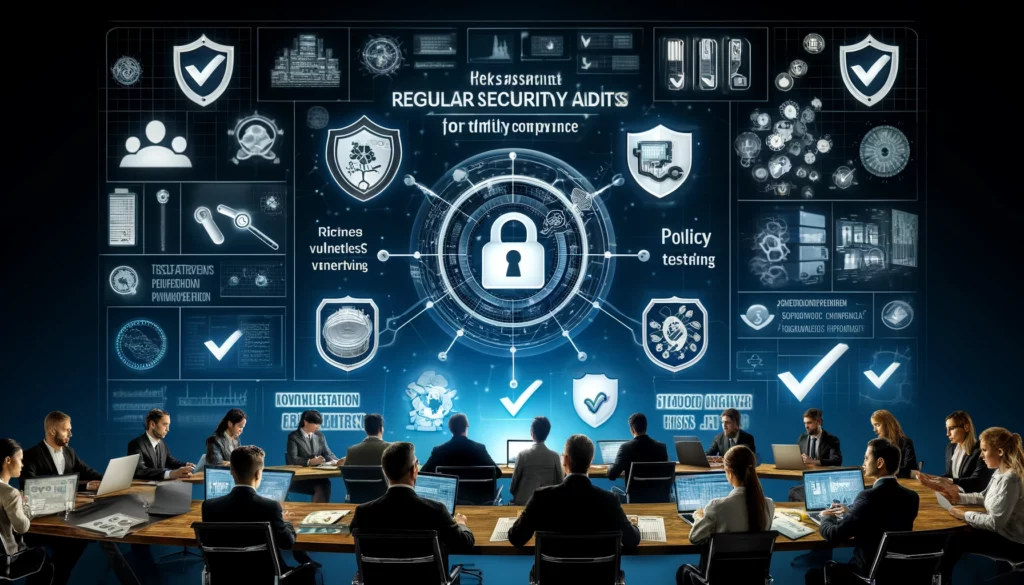businesses face an ever-evolving landscape of cyber threats. Ensuring the security of sensitive data and maintaining compliance with regulatory requirements is paramount. Regular security audits play a crucial role in achieving these objectives. This blog post explores the importance of regular security audits for compliance and how they help safeguard your business.
What is a Security Audit?
A security audit is a comprehensive assessment of an organization’s information system, policies, and procedures. It aims to identify vulnerabilities, ensure compliance with regulatory standards, and evaluate the effectiveness of existing security measures. Security audits can be conducted internally by an organization’s IT team or externally by third-party experts.
Why are Regular Security Audits Important?
- Identify Vulnerabilities: Regular security audits help identify vulnerabilities in your systems and processes. By uncovering weaknesses before cybercriminals can exploit them, you can take proactive measures to strengthen your defenses.
- Ensure Compliance: Many industries are subject to strict regulatory requirements, such as GDPR, HIPAA, and PCI-DSS. Regular audits ensure that your organization complies with these regulations, avoiding costly fines and legal repercussions.
- Protect Sensitive Data: Protecting sensitive data, such as customer information and financial records, is critical. Security audits help ensure that your data protection measures are adequate and effective, reducing the risk of data breaches and theft.
- Enhance Security Posture: Continuous improvement is essential in cybersecurity. Regular audits provide insights into the effectiveness of your security measures and highlight areas for enhancement. This iterative process helps maintain a robust security posture.
- Boost Customer Confidence: Customers trust businesses that prioritize their data security. Regular security audits demonstrate your commitment to protecting customer data, boosting confidence and enhancing your reputation.
- Mitigate Risks: By identifying and addressing potential threats, security audits help mitigate risks. This proactive approach reduces the likelihood of successful cyber attacks and minimizes the impact of any breaches that do occur.
- Streamline Incident Response: Regular audits help streamline your incident response process. By assessing your current procedures, you can identify gaps and implement improvements, ensuring a swift and effective response to security incidents.
Key Components of a Security Audit
- Risk Assessment: A thorough risk assessment identifies potential threats and evaluates their impact on your organization. This step helps prioritize security efforts and allocate resources effectively.
- Vulnerability Scanning: Automated tools scan your systems for known vulnerabilities, such as outdated software or misconfigured settings. This process provides a baseline for identifying weaknesses that need to be addressed.
- Penetration Testing: Ethical hackers simulate cyber attacks to test your defenses. Penetration testing provides a real-world perspective on your security posture and helps uncover vulnerabilities that automated tools might miss.
- Policy and Procedure Review: Reviewing your security policies and procedures ensures they align with best practices and regulatory requirements. This step involves evaluating access controls, data handling procedures, and incident response plans.
- Compliance Check: Auditors assess your compliance with relevant regulations and standards. This check ensures that your organization meets all legal requirements and helps avoid penalties and fines.
- Reporting and Recommendations: The audit concludes with a detailed report outlining findings and recommendations. This report provides actionable insights to improve your security measures and enhance compliance.
Best Practices for Conducting Security Audits
- Schedule Regular Audits: Establish a regular audit schedule to ensure ongoing security and compliance. Depending on your industry and regulatory requirements, this might be annually, semi-annually, or quarterly.
- Use Qualified Auditors: Engage qualified auditors with expertise in your industry and the latest cybersecurity practices. External auditors provide an unbiased perspective and bring specialized knowledge to the table.
- Document and Track Findings: Thoroughly document audit findings and track the implementation of recommendations. This documentation helps demonstrate compliance and supports continuous improvement efforts.
- Involve Key Stakeholders: Involve key stakeholders, including IT, legal, and executive teams, in the audit process. Collaboration ensures a comprehensive approach to security and compliance.
- Follow Up on Recommendations: Implement audit recommendations promptly and conduct follow-up audits to ensure that changes have been effective. Continuous monitoring and improvement are essential to maintaining a strong security posture.
Conclusion
Regular security audits are a vital component of a robust cybersecurity strategy. They help identify vulnerabilities, ensure compliance with regulatory requirements, and protect sensitive data. By conducting regular audits and following best practices, organizations can enhance their security posture, mitigate risks, and maintain customer trust. In an era of increasing cyber threats, regular security audits are not just a regulatory necessity—they are a strategic imperative for safeguarding your business.

